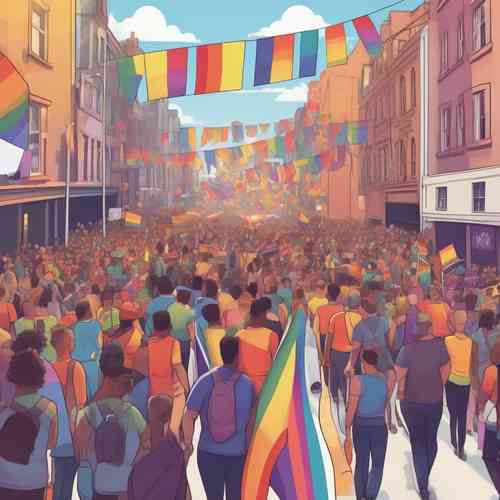- Published on
Global Pride Marches Unite Against Crackdowns: A Look at the 2025 Travel Trends
- Authors

- Name
- Juno Ryelie

Global Pride Marches Unite Against Crackdowns: A Look at the 2025 Travel Trends
In 2025, LGBTQ+ Pride marches are taking on a new level of significance as cities worldwide unite to protest against rising political tensions and government crackdowns. From Budapest to New York City, these marches are becoming powerful displays of defiance, impacting travel trends and forcing the global travel industry to navigate a complex landscape of celebration and conflict.
Event/Topic Overview
Budapest, alongside cities like New York City, São Paulo, London, Toronto, Barcelona, Berlin, Amsterdam, Cape Town, Mexico City, Madrid, and Oslo, is at the forefront of the 2025 LGBTQ+ Pride movement. Despite facing government surveillance and crackdowns, Budapest's Pride march drew tens of thousands, becoming a symbol of resistance against laws that threaten LGBTQ+ communities.
These Pride marches aren't just celebrations; they are demonstrations demanding freedom, visibility, and the right to exist without shame. The global travel industry is closely watching these events, as they significantly influence where and how people choose to travel.
Key Highlights & Standouts
Worldwide Pride Celebrations
Despite rising political tensions, 2025 saw vibrant Pride marches across the globe. New York City's Pride, with its roots in the Stonewall Riots, continued to be a dazzling display. São Paulo hosted the world's largest Pride gathering, with millions dancing in the streets, turning joy into a form of protest.
Cities such as London, Sydney, Toronto, Berlin, Amsterdam, and Cape Town solidified their positions as safe and inclusive havens for LGBTQ+ travelers, attracting those seeking belonging and safety.
Government Warnings and Traveler Choices
Several governments, including the UK, Belgium, Netherlands, France, and Canada, issued travel warnings concerning participation in banned events like Budapest Pride. These warnings highlight the risks travelers face in certain regions.
Travel Industry at a Crossroads
The travel industry is grappling with the impact of these global movements. Destinations like Vienna, Berlin, Amsterdam, and Madrid are actively promoting themselves as safe and inclusive alternatives, aiming to attract travelers avoiding uncertainty elsewhere. The LGBTQ+ travel market, valued at over $218 billion annually, is a significant economic factor.
Global Uprisings and Travel Safety
2025 has seen massive protests worldwide, including the no Kings protest in the United States, which spread to numerous cities and countries. Political turmoil in Turkey, Germany, Slovakia, The Hague, Kenya, Togo, Thailand, and Serbia has also created volatility, impacting the tourism industry.
Public & Critical Reaction
The LGBTQ+ community and its allies have shown remarkable resilience, with tens of thousands marching in Budapest despite the threats. Public sentiment is strongly against government crackdowns, as evidenced by a petition with over 120,000 signatures demanding Hungary reverse its ban on LGBTQ+ events.
Travelers are increasingly making ethical choices, favoring destinations that align with their values. Many are willing to boycott places that fail to protect freedom and inclusivity, putting pressure on the travel industry to take a stand.
Significance & What's Next
The events of 2025 mark a turning point for the travel industry, as political and social issues increasingly influence travel decisions. Destinations must now consider their stance on human rights and inclusivity to attract travelers who prioritize these values.
The future of travel will likely involve more conscious choices, with travelers actively seeking destinations where they feel safe and welcomed. The travel industry will need to adapt by promoting inclusivity and supporting human rights to remain relevant in this changing landscape.
The NYPD's GOAL Protests Exclusion from NYC Pride March
In New York City, a dispute arose concerning the Gay Officers Action League (GOAL) and their participation in the NYC Pride March. The disagreement centered around the Heritage of Pride's policy against weapons at the event, preventing GOAL members from marching in full uniform with their service weapons. NYPD Commissioner Jessica Tisch criticized the decision, calling it hypocritical to have uniformed officers provide security for the march while excluding GOAL from participating in uniform.
Conflicting Stances
Heritage of Pride, the organization behind NYC Pride, maintained that their weapons policy was in place to ensure the safety of all participants. They offered a compromise, allowing GOAL to march in uniform but without carrying their service weapons. GOAL, however, viewed this as exclusionary and a denial of their identity as both LGBTQ+ individuals and law enforcement officers.
Det. Brian Downey, president of GOAL, argued that the group had proudly marched in uniform for years and that their presence was as much of a protest as it was a celebration. The disagreement brought to light ongoing tensions between law enforcement and some members of the LGBTQ+ community, particularly concerning issues of safety and representation.
Broader Implications
The conflict between GOAL and Heritage of Pride reflects a larger conversation about inclusivity and representation within the LGBTQ+ community. It raises questions about how to balance safety concerns with the desire for full participation and recognition of diverse identities. The debate underscores the complexities of creating spaces where everyone feels welcome and respected.
The events surrounding the 2025 Pride marches highlight the evolving role of travel as a form of activism. As travelers become more conscious of the social and political implications of their choices, destinations and organizations must respond by prioritizing inclusivity, human rights, and ethical practices.
Stay informed about evolving travel trends and social movements to make conscious travel decisions. Support destinations that champion inclusivity and human rights, and advocate for a world where everyone can travel freely and safely. Catch the highlights and follow the ongoing discussions to learn more.